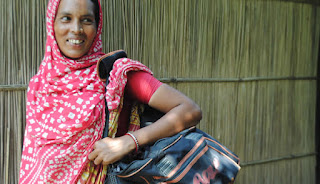Base of the pyramid (BoP) approaches have
been attracting a lot of attention in business and development circles
lately. Although typically associated with highly publicised schemes
such as Grameen’s “village phone ladies” and Hindustan Unilever’s
“Project Shakti”, a number of BoP initiatives have sprung up across
Africa and Asia to address a range of development concerns, from health
and energy to gender empowerment and poverty reduction.
For the last few years my colleagues* and
I at the Saïd Business School have researched the opportunities that
BoP distribution systems provide for women to earn an income by selling
consumer goods door-to-door in communities beyond the reach of
mainstream retail. We’ve looked at one scheme in depth: CARE
Bangladesh’s Rural Sales Programme (RSP), which aims to create
employment opportunities for marginalized women and to improve the
access of the rural poor to a range of consumer goods.
Unlike business-led BoP distribution
systems such as Project Shakti, CARE has grown the system from a small
pilot scheme in 2004 into a sales network of 2,640 women known as aparajitas (meaning
women who do not accept defeat) who distribute a basket of branded
goods (e.g. Bic, Danone, Bata and Unilever) to other low-income
households. The aparajitas not only sell multi-national company
products but also goods made by rural entrepreneurs such as saris and
prepared foods. Our research found that the RSP provides an important
income-generating opportunity for some of Bangladesh’s most marginalised
women -enabling them to gain a measure of financial autonomy and to
improve food security in their households. The success of the program
has also led to a joint venture between CARE International and
danone.communities named ‘JITA’ - an NGO-private sector hybrid that aims
to employ 12,000 women and reach 10 million customers in Bangladesh by
2014. For more information on the CARE RSP, see our teaching case and teaching notes, and our forthcoming paper in Oxfam’s Gender and Development.
There will also be a panel discussion on the CARE RSP at the Skoll
World Forum for Social Entrepreneurship at Saïd Business School, Oxford
on Thursday 29 March.
Though schemes like the RSP highlight the
potential for BoP approaches to provide economic empowerment for poor
women, they are not a panacea. There are ethical concerns about pursuing
development through increased consumption, especially among the world’s
poorest communities, and questions about whether development funds
should be used to expand consumer markets for global corporations.
There are also environmental questions about the wisdom of selling
single serve sachets in a context of global climate change, and the
long-term financial viability of the model as markets may become
saturated as the popularity of BoP projects increases, eroding women’s
earnings. The challenges and opportunities of BoP systems will be
explored in a Development Studies New Initiatives scheme titled: “The
New Economies of Development: Critical Engagements with the Bottom of
the Pyramid,” a collaboration between the Universities of Edinburgh,
Oxford and Sussex.
The project will host an open public debate titled ‘The BoP Approach: Responsible Capitalism or Business as Usual?’, at Saïd Business School, University of Oxford on Thursday 3 May. For more information, please email me.
* Professor Linda Scott and Mary Johnstone-Louis


No comments:
Post a Comment
Note: Only a member of this blog may post a comment.